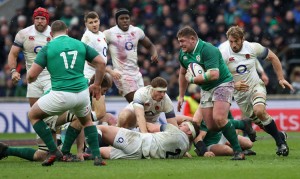Ireland Slams Six Nations
March 20, 2018
This past Saturday, March 17, the Irish men’s national Rugby Union team celebrated St. Patrick’s Day by defeating the English team 24-15 at Twickenham Stadium in London, England. The win gave Ireland the Six Nations Championship title and the nation’s third ever Grand Slam (an undefeated tournament). Ireland last achieved Grand Slams in 1948 and 2009. The Six Nations is an annual tournament that also includes the national rugby teams of France, Italy, Scotland, and Wales. The popular rough-and-tumble tournament is one of the biggest outside the Rugby World Cup (last won by New Zealand in 2015). The United Kingdom’s National Westminster Bank (NatWest) sponsored the 2018 tournament, which was officially called the NatWest 6 Nations.

Tadhg Furlong of Ireland charges upfield during the NatWest Six Nations match between England and Ireland at Twickenham Stadium on March 17, 2018, in London, England. Ireland defeated England 24-15. Credit: © David Rogers, The RFU Collection/Getty Images
Led by hulking “man of the match” Tadhg Furlong and halfbacks Conor Murray and Johnny Sexton, Ireland dominated the snowy pitch from the off (offset), scoring its first try (akin to a touchdown in American football) just five minutes into the game. A second try and 2-point conversion gave Ireland a solid 14-0 lead, but sloppy play opened the door for England’s Elliot Daly, who scored a try at the 31-minute mark. (The conversion failed.) The English momentum stopped there as Ireland center Jacob Stockdale scored his seventh try of the tournament, a Six Nations record. Ireland took a commanding 21-5 lead into halftime.
A penalty kick added three points to Ireland’s lead, but Daly scored again for England (again the conversion failed) to make it 24-10. Ireland’s solid green defense then repeatedly stuffed the home white attempts to score before allowing a relatively meaningless try on the final play of the match (the 80th minute) for a final score of 24-15.
Ireland dominated this year’s Six Nations, routing England, Italy, and Scotland, and grinding out tough wins against France and Wales. The Irish squad advanced to World Rugby’s number two ranking, behind only New Zealand’s powerful All Blacks, a team Ireland will face in November ahead of next year’s Rugby World Cup. England held the number two spot prior to this year’s Six Nations Championship. The team dropped to number three, just ahead of the Wallabies of Australia. An improving Scotland team is now ranked fifth in the world.
The Six Nations tournament began as a competition among the British “Home Nations” of England, Ireland, Scotland, and Wales in 1883. The 1910 addition of France made it a Five Nations Championship. France bowed out of the tournament in 1932, and the tournament halted altogether during World War II (1939-1945). But the competition returned—with France included—in 1947. Since the modern Six Nations format began in 2000 (now including Italy), England has won the tournament six times. France is second with five championships. Wales and Ireland have four Six Nations titles each, and Italy and Scotland have yet to win.
Within the Six Nations tournament, other team awards—aside from the championship and Grand Slam—include the Triple Crown, which goes to any Home Nation team that defeats the other three in a given year. The worst team in the tournament “wins” the Wooden Spoon each year. Individual nations also swap annual trophies. The Calcutta Cup goes to the winner of the England-Scotland match. Scotland and Ireland play for the Centenary Quaich (a quaich «kwaykh» is a ceremonial drinking cup), and Ireland competes with England for the Millennium Cup. France and Italy play each year for the Giuseppe Garibaldi Trophy.


